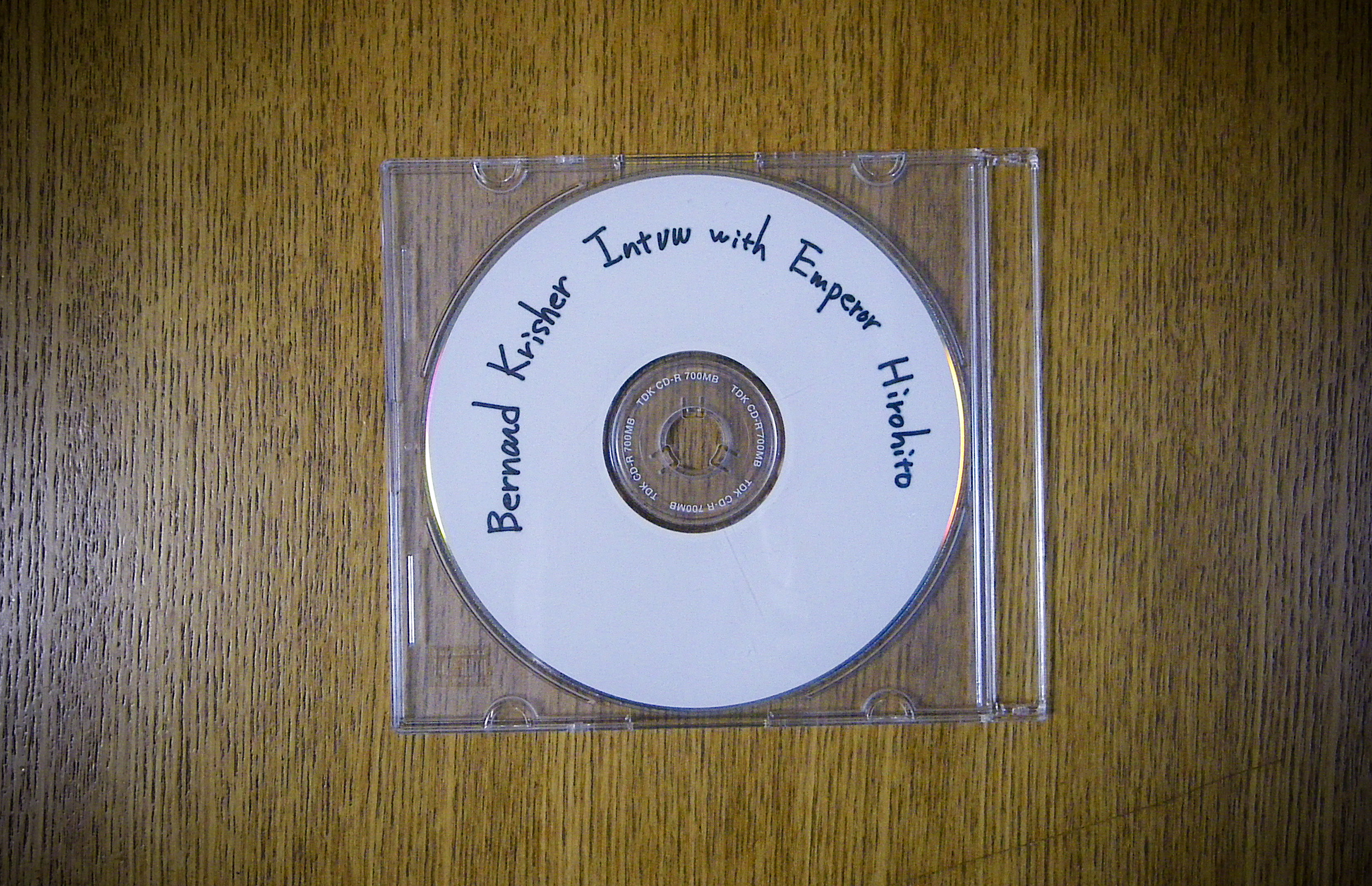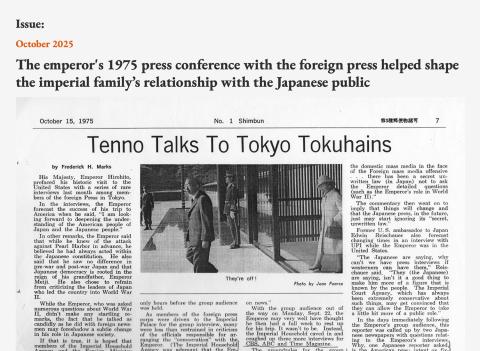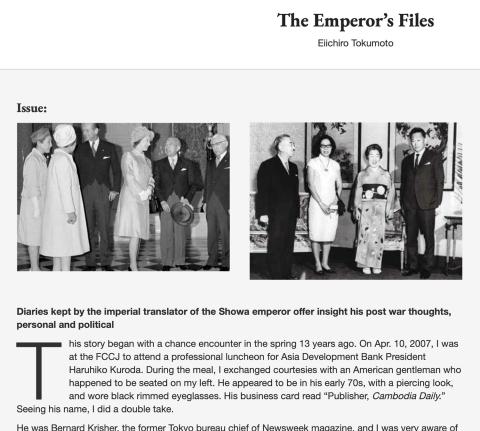Issue:
November 2025
Newsweek’s landmark 1975 interview with Emperor Hirohito included some creative editing

"I'll give you this. It might be helpful for you."
With these words, Bernard Krisher handed me a CD-ROM with a mischievous smile. Looking back, I realize that this was the beginning of my puzzle-solving journey.
On Thursday afternoon, June 28, 2007, at a restaurant in Hiroo, Minato Ward, Tokyo, I was having lunch with Bernard Krisher, the former Tokyo bureau chief of Newsweek magazine. Suddenly, midway through our conversation, Krisher handed me a CD-ROM. For a brief moment his act left me bewildered. It was the audio data of Krisher's one-on-one interview with the Emperor Hirohito, from half a century ago.
Every journalist dreams of landing a scoop. An exclusive interview with Emperor Showa would undoubtedly be a global scoop. During World War II, he was worshiped by the Japanese people as a living god. After the war, as a symbol of Japan, he witnessed the country's reconstruction and prosperity, until his often turbulent life ended in 1989. He both witnessed and played a significant role in the history of the 20th century, and his funeral was attended by heads of the world's leading nations, including then U.S. President George H.W. Bush.
Several members of the FCCJ were successful in securing exclusive interviews with Emperor Showa in the past. Most of these interviews occurred in September 1975.
At the time, Emperor Showa and Empress Nagako were preparing for their first official visit to the United States. This was a landmark event in the history of Japan-U.S. relations, marking 30 years since the end of the war. As I wrote in last month's Number 1 Shimbun, before the couple left, the Japanese government strongly feared that the issue of the emperor's war responsibility would be raised during his U.S. visit. Therefore, a press conference was arranged with FCCJ reporters, in an attempt to influence American public opinion ahead of the imperial couple's visit.
In addition, several foreign correspondents were granted exclusive one-on-one interviews with the emperor, of whom the first and most famous print media interviewer was Krisher.
I knew Krisher personally and once asked him about what happened at the time. He informed me that after the U.S. visit was announced, he had met with many politicians and bureaucrats for over six months to lay the groundwork for consensus. These included Deputy Prime Minister Takeo Fukuda, Foreign Minister Kiichi Miyazawa, and Grand Master of Ceremonies for the Imperial Household Agency Morio Yukawa. He also met with middle-ranking bureaucrats and asked them to refrain from opposing the interview request when their opinions were sought.
At 11 a.m. on Saturday, September 20, 1975, Krisher's interview with the emperor took place in the Shakkyo-no-Ma (drawing room) of the Imperial Palace. The questions also touched on the emperor's responsibility for the war, and the article, which appeared in Newsweek the following week, caused a great stir both at home and abroad. This also seemed to trigger a succession of interviews with three major media organizations: CBS TV, ABC TV, and Time magazine. (NBC TV was also granted an interview prior to Krisher’s.)
The CD-ROM I received from Krisher contained the audio data of this interview. As I had already read the Newsweek article, and thinking listening to it was not worth the trouble, I deposited it in a cardboard box at my home, leaving it untouched.
In March 2019, shortly after Krisher died at a Tokyo hospital at age 87, I slipped the CD-ROM into my laptop computer and listened to the audio. It was then I noticed something suspicious. I reread Krisher's article and, sure enough, I was right: parts of the article differed from the actual audio. These appeared in the third exchange during the interview.
Q: What are Your Majesty’s views toward those Japanese who feel the imperial tradition is no longer necessary in a modern Japan?
A: There are many different people in this country but I believe, generally speaking, the Japanese people have a respect for the imperial family.
However, the actual question in the audio data on the CD-ROM was as follows:
Q: How do you look upon those people who still worship Your Majesty as they did in pre-war days?
The question, originally referring to the fanatical emperor worship that was common before and during the war, had been replaced by a completely different question. This is not a matter of a mistranslation or editing glitch. Newsweek had published a question that wasn't actually asked.
Readers who see this will have a completely different impression of Hirohito. At the time, memories of Pearl Harbor were still strong in the U.S., and there was great interest in whether Japan might revert to militarism. However, listening to the original audio gives the impression that the emperor was trying to evade the question.
If speculation on my part is permitted, I would say that the emperor's aides, who were present during the interview, may have recognized the potential danger of this exchange. Americans may have interpreted this as meaning that the emperor had not fully reflected on his country's past militarism. However, once the emperor had answered, it could not be modified. So there was only one option: to replace the question in the text with a different one.
Those present in the Shakkyo-no-Ma that day were Grand Chamberlain Sukemasa Irie, the Emperor's long-time interpreter Hideki Masaki, Grand Master of Ceremonies Yukawa, and foreign ministry bureaucrat Naraichi Fujiyama. According to Krisher, a transcribed taped interview, sitting with Fujiyama, took place in a separate room in the Imperial Palace. However, he was not allowed to take the tape with him, and the tape was only returned to him by Irie after Emperor Showa's visit to the United States.
When I heard this from Krisher before, I wondered, "Why did they go to such troublesome lengths?" But if their motive was to hide the actual audio data, it makes sense. Krisher accepted a request from His Majesty's aides, revised the article, and promised not to reveal anything. Perhaps he had provided me with the CD-ROM to make me aware of this, hoping I'd find the subterfuge. This also solves the mystery of the "Masaki Tapes."
Hideki Masaki, who served as Emperor Showa's interpreter for many years, kept a diary in English, recording the emperor's conversations with foreign royalty, politicians, military personnel, and businessmen. These included politically sensitive conversations with Britain's Queen Elizabeth II, Singapore’s Prime Minister Lee Kuan Yew and the American banker David Rockefeller, among others. After the emperor's death in January 1989, Masaki revealed the contents of the document in a series of interviews with Krisher.
These interviews were stored on 20 cassette tapes (which I call the "Masaki Tapes") and served as valuable historical testimony. When I wrote "The Emperor's Files," Krisher kindly provided me with these unpublished tapes, and I was happy to extract their contents for my own use.
At the time, I wondered why Masaki had shared the contents of his diary with Krisher. Under normal circumstances, the emperor's interpreter sharing conversations with foreign guests with an American journalist would be unthinkable. However, it makes sense if it was his way of repaying the favor for revising the Newsweek article. To Masaki, Krisher was not just a journalist, but a comrade who mutually shared the secret of revising the interview. If that's the case, then the secret deal made in a room in the Imperial Palace half a century ago gave birth to the "Masaki Tapes," providing fascinating insights into the emperor’s thoughts and beliefs.
Two months after Krisher's death, on the evening of May 16, 2019, I attended a memorial service for him held at the FCCJ. At the service, a copy of the Newsweek interview with the emperor was placed on a white tablecloth. Nearby, a photo of a smiling Krisher was displayed. From his expression, he seemed to be speaking to me, as if to say, "Okay, Eiichiro. You got me."
Eiichiro Tokumoto is a writer living in Tokyo.



